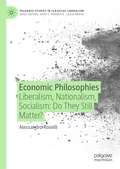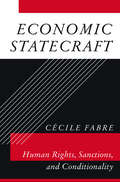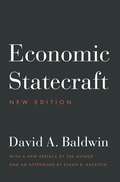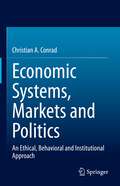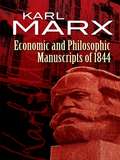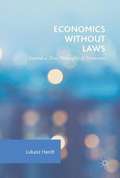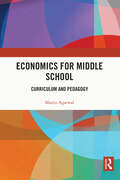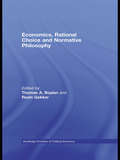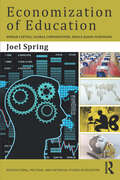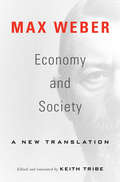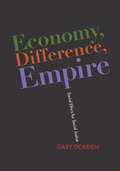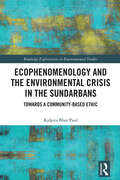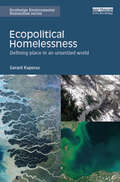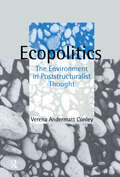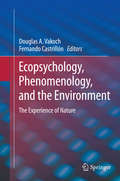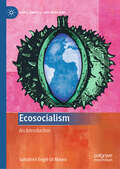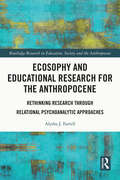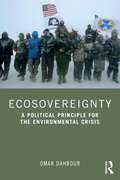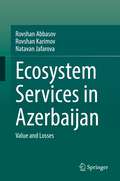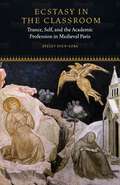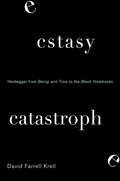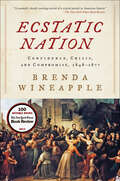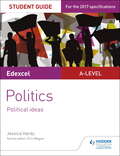- Table View
- List View
Economic Philosophies: Liberalism, Nationalism, Socialism: Do They Still Matter? (Palgrave Studies in Classical Liberalism)
by Alessandro RoselliThe book shows the ideological underpinning of the economist’s work, and the ideological perspectives are those that have largely prevailed in the last couple of centuries: liberalism, nationalism and socialism. It is on the ground and strength of these ideologies that systems of political economy have been built. Roselli explores the connections between theory and value judgements to identify the philosophical premises behind the economic reasoning of economists as diverse as Smith, Ricardo, Marx, Pareto, Keynes, Hayek, among others. Liberalism originally leaned towards an unhindered laissez-faire, then towards a wider role of the State in the economic system, under the influence of socialist ideology, then again it has relied on an individualistic approach to issues of wealth production and distribution; more recently the unrealiability of this approach has been revealed by systemic crises, suggesting new reflections and uncertainties about the coherence of economic reasoning with the liberal idea: an institutional and historical perspective may open new spaces to the understanding of a liberal and capitalistic economy. The vicissitudes of economic nationalism, its statist and protectionist features, its decline and recent resurgence are examined, being unclear what shape it is currently taking from an economic and political viewpoint. This is particularly obscure in the case of that specific form of nationalism called populism. The decline and fall of Marx’s historical materialism cannot hide the inherent contrast of interest between the two sides of a labour contract. The lasting legacy of socialism is the enduring and multiform relevance – from a cowed labour force to environmental issues - of social themes in modern economies.
Economic Politics in the United States
by William R. KeechThis book uses macroeconomic performance to evaluate democratic institutions and processes in the United States. Originally published in 1995, this revised edition gives a more pessimistic assessment than the first did. Employing macroeconomic performance as a lens to evaluate democratic institutions, the author uses public choice and political economy models of political behavior that give room for opportunism on the part of public officials and shortsightedness on the part of voters to see if democratic institutions lead to inferior macroeconomic performance. What has happened since the publication of the first edition to make the conclusions about democratic performance more pessimistic? The author finds that informal institutions of democracy, such as the norm that the federal budget should be balanced, have deteriorated so that performance suffers.
Economic Statecraft: Human Rights, Sanctions, and Conditionality
by Cécile FabreEconomic sanctions provide an alternative to waging war or a means to advance human rights. But are they morally justifiable? Philosophers have explored the ethics of war but rarely the ethics of carrots and sticks. Cécile Fabre offers a defense of economic statecraft, laying out a normative framework for this critical tool of diplomacy.
Economic Statecraft: New Edition
by David A. BaldwinA new edition of the classic work on the economic tools of foreign policyToday's complex and dangerous world demands a complete understanding of all the techniques of statecraft, not just military ones. David Baldwin's Economic Statecraft presents an analytic framework for evaluating such techniques and uses it to challenge the notion that economic instruments of foreign policy do not work. Integrating insights from economics, political science, psychology, philosophy, history, law, and sociology, this bold and provocative book explains not only the utility of economic statecraft but also its morality, legality, and role in the history of international thought.Economic Statecraft is a landmark work that has fundamentally redefined how nations evaluate crucial choices of war and peace. Now with a substantial new preface by the author and an afterword by esteemed foreign-policy expert Ethan Kapstein, this new edition introduces today's generation of readers to the principles and applications of economic statecraft.
Economic Systems, Markets and Politics: An Ethical, Behavioral and Institutional Approach
by Christian A. ConradThis textbook takes a new approach to economics by taking into account behavioral sciences and ethics. The basics of institutional economics are the starting point of the book, which are combined with insights from business ethics and behavioral science. It analyzes human behavior in order to discover incentives for economic agents to behave in a welfare-maximizing way, and analyzes the impact of human behavior and morality on economic systems, markets and politics. This textbook draws from new research results from behavioral economics, as well as from other disciplines, such as psychology and sociology, thus leading to new conclusions for economic science. The book sheds light on how people behave and how such behavior can be guided towards moral welfare for everyone. Furthermore, the reader is introduced to behavioral games, and to how these can be used to study economic behavior. Each chapter contains a summary on behavioral science findings as well as one on ethical findings. This book is a must read for advanced students in economics and political science but can also be of use to researchers of economics, as well as policymakers and business executives due to its focus on applications.
Economic and Philosophic Manuscripts of 1844
by Karl MarxWritten in 1844 as a series of notes, Marx's posthumously published critiques on the conditions of modern industrialist societies forms the foundation of the author's denunciation of capitalism. Combining elements of psychology, sociology, and anthropology, it is a profound examination of the human condition rooted in a philosophy of economics.In this concise treatise, Marx presents an indictment of capitalism and its threat to the working man, his sense of self, and his ultimate potential. With a focus on "Marxist Humanism," he describes the alienation of laborers in a capitalist system: since the results of their work belong to someone else, they are estranged from their own labor and can never function as freely productive beings. Through a powerful mixture of history and economics, Marx explores the degenerative effect of capitalism on the proletariat and his true human nature.Regarded as one of his most important books, Economic and Philosophic Manuscripts of 1844 is a first glimpse at Marx's fascinating transition from philosophy to economics. Accessible and influential, it is an important predecessor to the Communist Manifesto and essential to an understanding of Marxist theory.
Economics Without Laws: Towards a New Philosophy of Economics
by Łukasz HardtThis book offers a vision of economics in which there is no place for universal laws of nature, and even for laws of a more probabilistic character. The author avoids interpreting the practice of economics as something that leads to the formulation of universal laws or laws of nature. Instead, chapters in the book follow the method of contemporary philosophy of science: rather than formulating suggestions for practicing scientists of how they should do research, the text describes and interprets the very practice of scientific research. This approach demonstrates how economists can explain economic phenomena not by subsuming them under general laws, but rather by building models of these phenomena, by referring to causes, or even by investigating what is in the nature of given factors, events, or circumstances to produce.
Economics for Middle School: Curriculum and Pedagogy
by Manju AgarwalThis book discusses the importance of teaching fundamental economic concepts as part of the middle school social science curriculum in India. It examines the status of economics in Indian schools, the issues faced in teaching it at the middle school level, and emphasizes the need for increasing the economic literacy of students. It offers valuable recommendations to curriculum planners and educators to help them bolster economics education in Indian schools. The author presents an extensive curriculum framework with the intention of developing intellectual and social skills in students. The book also features classroom tested lessons, content guidelines, and a comprehensive teaching plan for grades six, seven, and eight. A crucial contribution to the study of school education in India, this book will be of interest to teachers, students, and researchers of education, economics education, and economics. It will also be useful for policy planners, professional economists, administrators, school boards, and research institutions.
Economics, Rational Choice and Normative Philosophy (Routledge Frontiers of Political Economy #Vol. 116)
by Thomas A. Boylan Ruvin GekkerFollowing Amartya Sen’s insistence to expand the framework of rational choice theory by taking into account ‘non-utility information,’ economists, political scientists and philosophers have recently concentrated their efforts in analysing the issues related to rights, freedom, diversity intentions and equality. Thomas Boylan and Ruvin Gekker have gathered essays that reflect this trend. The particular themes addressed in this volume include: the measurement of diversity and freedom, formal analysis of individual rights and intentions, judgment aggregation under constraints and strategic manipulation in fuzzy environments. Some papers in the volume also deal with philosophical aspects of normative social choice.
Economization of Education: Human Capital, Global Corporations, Skills-Based Schooling (Sociocultural, Political, and Historical Studies in Education)
by Joel SpringIn this timely, cogent analysis of trends and powerful forces shaping global educational policy today, Joel Spring focuses on how economization is making economic growth and increased productivity the main goals of schools, and the ways these goals are achieved—including measuring educational policies by their costs and economic benefits, shaping family life to ensure productive workers and high-achieving students, introducing entrepreneurship education into curricula from preschool through higher education, and increasing the involvement of economists in educational policy analysis. Close attention is given to the Organization for Economic Cooperation and Development (OECD), the World Bank, the World Economic Forum, and multinational corporations, which, as advocates of economization, want schools to focus on teaching hard and soft skills needed by the global labor market. Economization raises questions about the effects of economically driven agendas for schools: Will education policies advocated by global organizations and multinational businesses corporatize and standardize human personalities and families? What type of global worker is being sought by global organizations and multinational corporations? What education programs are supported to educate the ideal global worker? What is the ideal family life for economic growth and development? Detailing and analyzing the politics and motivations driving economization, the book concludes with an assessment of the impacts of the confluence of business interests, economic theories, governments, and educators.
Economy and Society: A New Translation (People, Markets, Goods: Economies And Societies In History Ser. #Volume 10)
by Max WeberKeith Tribe’s new translation presents Economy and Society as it stood when Max Weber died. One of the world’s leading experts on Weber’s thought, Tribe has produced a clear and faithful translation that will become the definitive English edition of one of the few indisputably great intellectual works of the past 150 years.
Economy, Difference, Empire: Social Ethics for Social Justice
by Gary DorrienSourcing the major traditions of progressive Christian social ethics-social gospel liberalism, Niebuhrian realism, and liberation theology-Gary Dorrien argues for the social-ethical necessity of social justice politics. In carefully reasoned essays, he focuses on three broad subjects: the ethics and politics of economic justice; racial and gender justice; and anti-militarism, and makes a constructive case for economic democracy, a liberationist understanding of racial and gender justice, and an anti-imperial form of liberal internationalism. In Dorrien's view, the three major discourse traditions of progressive Christian social ethics share a fundamental commitment to transform the structures of society in the direction of social justice. His reflections on these topics feature extensive and innovative analyses of major figures, such as Walter Rauschenbusch, Reinhold Niebuhr, James Burnham, Norman Thomas, and Michael Harrington, and contemporary intellectuals, such as Rosemary R. Ruether, Katie Cannon, Gregory Baum, and Cornel West. Dorrien also weaves his personal experiences into his narrative, especially his involvement in social justice movements. The volume features a special chapter on Dorrien's published work during the 2008 presidential campaign and historic candidacy of Barack Obama.
Economy, Difference, Empire: Social Ethics for Social Justice (Columbia Series on Religion and Politics)
by Gary DorrienSourcing the major traditions of progressive Christian social ethics-social gospel liberalism, Niebuhrian realism, and liberation theology-Gary Dorrien argues for the social-ethical necessity of social justice politics. In carefully reasoned essays, he focuses on three subjects: the ethics and politics of economic justice, racial and gender justice, and antimilitarism, making a constructive case for economic democracy, along with a liberationist understanding of racial and gender justice and an anti-imperial form of liberal internationalism. In Dorrien's view, the three major discourse traditions of progressive Christian social ethics share a fundamental commitment to transform the structures of society in the direction of social justice. His reflections on these topics feature innovative analyses of major figures, such as Walter Rauschenbusch, Reinhold Niebuhr, James Burnham, Norman Thomas, and Michael Harrington, and an extensive engagement with contemporary intellectuals, such as Rosemary R. Ruether, Katie Cannon, Gregory Baum, and Cornel West. Dorrien also weaves his personal experiences into his narrative, especially his involvement in social justice movements. He includes a special chapter on the 2008 presidential campaign and the historic candidacy of Barack Obama.
Ecophenomenology and the Environmental Crisis in the Sundarbans: Towards a Community-Based Ethic (Routledge Explorations in Environmental Studies)
by Kalpita Bhar PaulThis book offers a philosophical analysis of the environmental crisis in the Indian Sundarbans, drawing upon phenomenological narratives. It nuances the present understanding of the crisis by introducing plurality in our metaphysical understanding of the environment and epistemological understanding of the human–environment relationship.Contemporary research on the Sundarbans mainly focuses on the impending threat of climate change, natural disasters, as well as increasing human–animal conflict, conservation, and forest access debates, while scholarly works have mostly used environmental impact assessments to offer technocratic solutions that prioritize a particular type of human–environment relationship characterized by an "anticipation of ruin." Rather than rushing to find solutions, I embark on a journey to unpack the meaning of crisis through phenomenological narratives of human–environment relationships. A deep dive into the human–environment relationship through an intentional engagement with the work-worlds of islanders, the formation of a more-than-human community is revealed, giving rise to community-based ethic that transcends the poverty of thought and imagination in comprehending the crisis of the Indian Sundarbans. This new ethical framework emphasizes the co-emergence of self-consciousness and eco-consciousness, serving as a moral impetus for individuals to act ethically towards the environment. This approach impels us to rethink what the Sundarbans is, how the crisis gets manifested to the inlanders and outsiders, and what kind of procedural changes are required to protect the Sundarbans as a living ecosystem instead of a natural museum.The book’s phenomenological depth and engaged philosophical framework will elicit deep interest from within academia and among practitioners who are working in environmental studies, philosophy, human ecology, and island studies. The convergence of conceptual understandings and field narratives will also draw the interest of research students working in correlated fields.
Ecopolitical Homelessness: Defining place in an unsettled world (Routledge Environmental Humanities)
by Gerard KuperusWhile our world is characterized by mobility, global interactions, and increasing knowledge, we are facing serious challenges regarding the knowledge of the places around us. We understand and navigate our surroundings by relying on advanced technologies. Yet, a truly knowledgeable relationship to the places where we live and visit is lacking. This book proposes that we are utterly lost and that the loss of a sense of place has contributed to different crises, such as the environmental crisis, the immigration crisis, and poverty. With a rising number of environmental, political, and economic displacements the topic of place becomes more and more relevant and philosophy has to take up this topic in more serious ways than it has done so far. To counteract this problem, the book provides suggestions for how to think differently, both about ourselves, our relationship to other people, and to the places around us. It ends with a suggestion of how to understand ourselves in an eco-political community, one of humans and other living beings as well as inanimate objects. This book will be of great interest to researchers and students of environmental ethics and philosophy as well as those interested in the environmental humanities more generally.
Ecopolitics: The Environment in Poststructuralist Thought (Opening Out: Feminism for Today)
by Verena Andermatt ConleyEcopolitics is a study of environmental awareness - or non-awareness - in contemporary French theory. Arguing that it is now impossible not to think in an ecological way, Verena Andermatt Conley traces the roots of today's concern for the environment back to the intellectual climate of the late 50s and 60s.The author considers key texts by influential figures such as Michael Serres, Paul Virilio, Gilles Deleuze and Felix Guattari, Michel de Certeau, Hélène Cixous and Luce Irigaray. Ecopolitics rehabilitates some ecological components of French intellectual thought of the past thirty years, and reassesses French poststructural thinkers who explicitly deal with ecology in their work.
Ecopsychology, Phenomenology, and the Environment
by Douglas A. Vakoch Fernando CastrillónThis book seeks to confront an apparent contradiction: that while we are constantly attending to environmental issues, we seem to be woefully out of touch with nature. The goal of Ecopsychology, Phenomenology and the Environment is to foster an enhanced awareness of nature that can lead us to new ways of relating to the environment, ultimately yielding more sustainable patterns of living. This volume is different from other books in the rapidly growing field of ecopsychology in its emphasis on phenomenological approaches, building on the work of phenomenological psychologists such as Maurice Merleau-Ponty. This focus on phenomenological methodologies for articulating our direct experience of nature serves as a critical complement to the usual methodologies of environmental and conservation psychologists, who have emphasized quantitative research. Moreover, Ecopsychology, Phenomenology and the Environment is distinctive insofar as chapters by phenomenologically-sophisticated ecopsychologists are complemented by chapters written by phenomenological researchers of environmental issues with backgrounds in philosophy and geology, providing a breadth and depth of perspective not found in other works written exclusively by psychologists.
Ecosocialism: An Introduction (Marx, Engels, and Marxisms)
by Salvatore Engel-Di MauroThis book offers an extensive critical overview of eco-socialism, one of the most generative and significant aspects of contemporary debates within socialism. Marxism has played a foundational role in the development of ecosocialism since its inception and has also led to critical reflections on the 20th century Marxism and ecological interpretation of Marxist writings. Despite the relevance of ecosocialism to the pressing debates on the ecological crisis and the growing literature on ecosocialism, there has not been a comprehensive account on ecosocialism and its variations. This volume seeks to fill this important gap and to pave the way for a more systematic development of this emerging paradigm. The book not only engages with a critique of other non-socialist ecological schools of thought in defence of ecosocialism, but also provides a critical overview of debates within ecosocialism and of ecosocialism itself. The latter includes an appraisal of ecosocialism in Bolivarian Venezuela and the implications of current efforts in the People's Republic of China to build an ecological civilisation. Furthermore, the book contains a crucial discussion about the relation between eco-socialism and indigenous studies and movements.
Ecosophy and Educational Research for the Anthropocene: Rethinking Research through Relational Psychoanalytic Approaches (Routledge Research in Education, Society and the Anthropocene)
by Alysha J. FarrellProblematizing the aims of education in the Anthropocene, this text illustrates the value of relational psychoanalytic theory in the study and practice of education amidst the climate crisis. Illustrating how dominant educational theory fails to acknowledge climate precarity and the consequences of living beyond the Earth’s carrying capacity, Ecosophy and Educational Research for the Anthropocene calls for a reorientation of scholarship to decentre the human subject. The author discusses the evolution of intersubjective psychoanalysis to make a case for a turn to relational and psychoanalytically informed educational research. Chapters foreground areas for educational researchers to consider in pursuing intersubjective inquiries into the affective dimensions of curriculum and pedagogy to foster an emergence of eco-attunement and ecosophical educational research (EER). By framing an ecosophical approach, this book enables educational leaders, researchers and educators to fulfil their responsibility to engage in educational praxis which is contextually responsive, relationally attuned and recognizant that we cannot be studied apart from our connections to the planet.
Ecosovereignty: A Political Principle for the Environmental Crisis
by Omar DahbourIn this book, Omar Dahbour develops the idea of ecosystem sovereignty, calling for a reinterpretation of some essential concepts in political philosophy, including territoriality, self-determination, peoplehood, and sovereignty, in order to make the case for peoples’ rights to protect and maintain their natural environments. In doing so, he theorizes current and historical struggles against resource extractions and land grabs, especially by food sovereignty and indigenous rights movements.The basic idea of ecosovereignty is that peoples living in relation to particular ecosystems have a collective right to ultimate authority over those systems and the resources they contain—provided they manage them sustainably. Dahbour argues that this authority has a legitimacy that overrides that of larger states, at least with regard to matters of environmental management. Ecosovereignty claims may strengthen challenges by peoples to states and corporations seeking to control and transform lands and waters for development, against the wishes of their inhabitants. Dahbour hopes the idea will provide a powerful tool for halting extractivism and ecocide, along with the extreme violence that these processes use against farming, indigenous peoples, and nature.Connecting political and environmental philosophy in an innovative way, Ecosovereignty: A Political Principle for the Environmental Crisis will keep scholars and students informed about an increasingly important topic.
Ecosystem Services in Azerbaijan: Value and Losses
by Rovshan Abbasov Rovshan Karimov Natavan JafarovaThis book aims to draw readers' attention to the benefits once present nature in Azerbaijan. Over the past hundred years, much of this has been lost because of the neglect of the intrinsic values of nature by both managers and local authorities, and the overuse of natural resources. For example, oil pollution and overfishing in the Caspian Sea have almost destroyed its fish and caviar resources. In this volume, the authors distinguish between the concepts of "gain" and "income" and show readers that short-term benefits based solely on monetary income deprive people and nature itself of long-term, lasting value. The book provides readers with real historical information, discusses the interactions between humans and nature, and shows, with real data and trends, the consequences of anthropogenic activity on natural resources in Azerbaijan. The authors cover fish, water, forest, mountain, and pasture ecosystems, draw attention to the impacts that pollution and other forms of environmental degradation have had on these resources, and the show the impact that resource depletion on people’s livelihoods. The book is intended primarily for managers, policymakers, students, and academics, and will be of interest to natural scientists, historians, and students of culture.
Ecstasy in the Classroom: Trance, Self, and the Academic Profession in Medieval Paris (Fordham Series in Medieval Studies)
by Ayelet Even-EzraCan ecstatic experiences be studied with the academic instruments of rational investigation? What kinds of religious illumination are experienced by academically minded people? And what is the specific nature of the knowledge of God that university theologians of the Middle Ages enjoyed compared with other modes of knowing God, such as rapture, prophecy, the beatific vision, or simple faith? Ecstasy in the Classroom explores the interface between academic theology and ecstatic experience in the first half of the thirteenth century, formative years in the history of the University of Paris, medieval Europe’s “fountain of knowledge.” It considers little-known texts by William of Auxerre, Philip the Chancellor, William of Auvergne, Alexander of Hales, and other theologians of this community, thus creating a group portrait of a scholarly discourse. It seeks to do three things. The first is to map and analyze the scholastic discourse about rapture and other modes of cognition in the first half of the thirteenth century. The second is to explicate the perception of the self that these modes imply: the possibility of transformation and the complex structure of the soul and its habits. The third is to read these discussions as a window on the predicaments of a newborn community of medieval professionals and thereby elucidate foundational tensions in the emergent academic culture and its social and cultural context. Juxtaposing scholastic questions with scenes of contemporary courtly romances and reading Aristotle’s Analytics alongside hagiographical anecdotes, Ecstasy in the Classroom challenges the often rigid historiographical boundaries between scholastic thought and its institutional and cultural context.
Ecstasy, Catastrophe: Heidegger from Being and Time to the Black Notebooks (SUNY series in Contemporary Continental Philosophy)
by David Farrell KrellIn Ecstasy, Catastrophe, David Farrell Krell provides insight into two areas of Heidegger's thought: his analysis of ecstatic temporality in Being and Time (1927) and his "political" remarks in the recently published Black Notebooks (1931–1941). The first part of Krell's book focuses on Heidegger's interpretation of time, which Krell takes to be one of Heidegger's greatest philosophical achievements. In addition to providing detailed commentary on ecstatic temporality, Krell considers Derrida's analysis of ekstasis in his first seminar on Heidegger, taught in Paris in 1964–1965. Krell also relates ecstatic temporality to the work of other philosophers, including Aristotle, Augustine, Kant, Schelling, Hölderlin, and Merleau-Ponty; he then analyzes Dasein as infant and child, relating ecstatic temporality to the "mirror stage" theory of Jacques Lacan.The second part of the book turns to Heidegger's Black Notebooks, which have received a great deal of critical attention in the press and in philosophical circles. Notorious for their pejorative references to Jews and Jewish culture, the Notebooks exhibit a level of polemic throughout that Krell takes to be catastrophic in and for Heidegger's thought. Heidegger's legacy therefore seems to be split between the best and the worst of thinking—somewhere between ecstasy and catastrophe.Based on the 2014 Brauer Lectures in German Studies at Brown University, the book communicates the fruits of Krell's many years of work on Heidegger in an engaging and accessible style.
Ecstatic Nation: Confidence, Crisis, and Compromise, 1848–1877
by Brenda Wineapple“From the death of John Quincy Adams through the Civil War to the tragedy of Reconstruction, Wineapple tells the American story brilliantly.” —Jon Meacham, Pulitzer Prize–winning authorA New York Times Notable Book of 2013A Kirkus Best Book of 2013A Bookpage Best Book of 2013Dazzling in scope, Ecstatic Nation illuminates one of the most dramatic and momentous chapters in America’s past, when the country dreamed big, craved new lands and new freedom, and was bitterly divided over its great moral wrong: slavery. With a canvas of extraordinary characters, such as P. T. Barnum, Walt Whitman, Frederick Douglass, and L. C. Q. Lamar, Ecstatic Nation brilliantly balances cultural and political history: It’s a riveting account of the sectional conflict that preceded the Civil War, and it astutely chronicles the complex aftermath of that war and Reconstruction, including the promise that women would share in a new definition of American citizenship. It takes us from photographic surveys of the Sierra Nevadas to the discovery of gold in the South Dakota hills, and it signals the painful, thrilling birth of modern America.An epic tale by award-winning author Brenda Wineapple, Ecstatic Nation lyrically and with true originality captures the optimism, the failures, and the tragic exuberance of a renewed Republic.“[A] fresh and riveting account of America at war with itself . . . Wineapple’s Ecstatic Nation does a laudable job of bringing to life not just the Civil War but the society in which it occurred—and has evolved into the present.” —Los Angeles Times“A masterly, deeply moving record of a crucial period in American history.” —The New York Times Book Review
Edexcel A-level Politics Student Guide 3: Political Ideas
by Jessica HardyWritten by experienced teacher Jessica Hardy this Student Guide for Politics:-Identifies the key content you need to know with a concise summary of topics examined in the AS/A-level specifications-Enables you to measure your understanding with exam tips and knowledge check questions, with answers at the end of the guide-Helps you to improve your exam technique with sample answers to exam-style questions-Develops your independent learning skills with content you can use for further study and research
